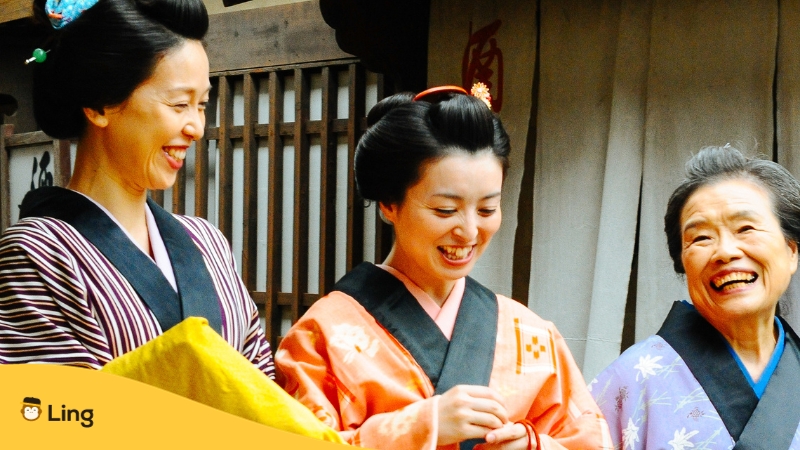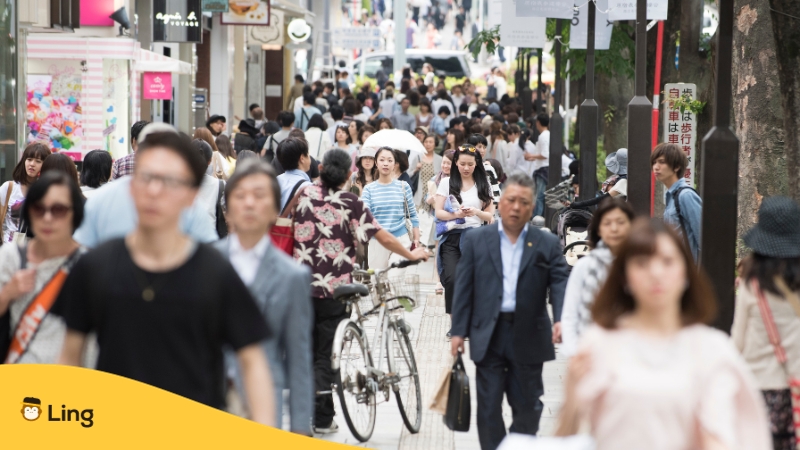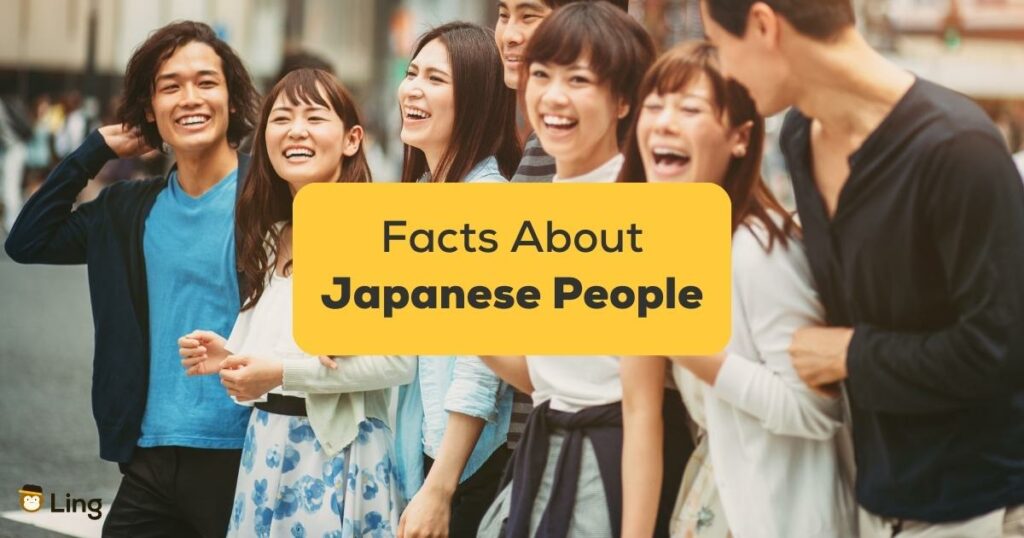Do you know that phrase “this is so Japanese”? It’s something people often say to describe something that seems very characteristic of Japanese culture. Why are they saying that? Are Japanese people interesting in any way?
Many people find Japan fascinating, and many have mentioned that Japanese people are quite unique. I’ve noticed that many people on social media like to talk about how Japanese kids are raised differently.
Hey, I was wondering if you’re curious about what makes the Japanese outstanding. Well, there are some exceptional habits they have that I’d love to share with you.
What Is Unique About Japanese People?
Let me share an important word with you. “人 (hito)” means person. When referring to a Japanese person, you would say, “日本人 (nihonjin).” Alright, let’s check out the top 10 facts together!
1. Bowing As A Form Of Greeting
Vocabulary: 挨拶 (aisatsu) means greeting.
Imagine you’re strolling through the vibrant streets of Japan. Suddenly, you come across two people engaged in a friendly encounter. But wait, something’s different! Instead of the usual handshake, we’re all familiar with, they gracefully bow to each other. It’s like a scene from a movie, where respect and tradition blend seamlessly with modern life.
In Japan, bowing is the gesture when it comes to greetings. Did you know that the depth and angle of a bow can speak volumes about respect and formality? Bowing at 15 degrees is used in casual situations; bowing at 30 degrees is used in Japanese business; bowing at 45 degrees is used to show respect and apology. So, remember that every angle counts when showing your manners, whether it’s a slight nod or a deep, sweeping bow.
2. High Population Density
Vocabulary: 住民 (jyumin) means population, citizen, resident.
The Land of Rising Sun is home to roughly 125 million people, earning it the prestigious 12th spot on the global population density leaderboard. Can you believe it? Especially Tokyo, the concrete jungle where dreams come true. In this city, a handful of Japanese citizens and expats are squeezed into relatively small areas.
3. Respect For Nature
Vocabulary: 自然 (shizen) means nature.
Regarding the Japanese archipelago, with more than half of the country covered in mountains and forests, the Japanese deeply respect the natural world. Nature appreciation is highly valued in Japanese culture, with activities like 花見 (hanami, which means watching cherry blossoms) and 生花 (ikebana, which means the Japanese art of flower arrangement) being widely practiced.

4. High Level Of Homogeneity
Vocabulary: 均質 (kinshitsu) means homogeneity.
Did you know that Japan used to be an isolated island long before World War II? In Japanese society, people value conformity and getting along with others. People often avoid standing out or going against social norms, which can make everything feel standardized.
It’s important to understand that most people in Japan are of ethnic Japanese descent or Japanese national by birth, with only 3 million foreign residents living in Japan. So, it’s obvious how this country has such a solid ethnic homogeneity, especially compared to other countries with much more ethnic group diversity.
5. Punctuality
Vocabulary: 定時性 (teijisei) means punctuality.
Japanese people are known for their punctuality. This should be a basic standard for every country, not just Japan. Imagine you’ve got an appointment, a meeting, or a hot date lined up. What’s the key to impressing everyone? Of course, arriving on time, or better yet, a few minutes early! It’s all about being respectful.
6. Strong Work Ethic
Vocabulary: 仕事 (shigoto) means work, job, employment.
Yeah, Japan is known for having a solid work culture. Many people there put in long hours and dedicate themselves to their jobs. Have you heard about this thing called “過労死 (karoshi)”? It’s this crazy phenomenon where people die from overwork. It’s been getting a lot of attention lately.
7. Safety-Oriented
Vocabulary: 安全 (ansei) means safety.
Japan is known for being a safe and orderly society, and a big reason for that is their strong focus on safety in their culture. Their attention to detail isn’t limited to engineering, public safety, cleanliness, and hygiene. It also extends to their money-saving habits. They’ll make sure they stay clear of any potential risks or challenges that might come up.
8. Love Using Public Transportation
Vocabulary: 公共交通機関 (koukyou koutsuukikan) means public transportation.
Well, you see, Japan has this amazing public transportation system that’s super efficient and reliable. They’ve got trains and buses that’ll get you where you need to go in no time. It’s pretty impressive. Punctuality, cleanliness, and safety are prominent in Japanese transit. No wonder why most Japanese people use public transportation.

9. Communicate Indirectly
Vocabulary: 通じる (uujiru) means (to) communicate (with).
In Japanese communication, non-verbal communication, like body language, facial expressions, and tone of voice, say more than words. Also, in Japanese culture, they really value saving face. It’s important for both themselves and others. Yeah, using indirect communication can be really helpful in preventing awkward situations and making sure someone’s self-respect is preserved.
Understanding these cues is essential to communicate effectively and avoid making them uncomfortable.
10. Long Life Expectancy
Vocabulary: 生活 (seikatsu) means life or living.
Did you know that Japan has many people over 100 years old? Yup, Japan is always up there regarding countries with the highest life expectancy.
Especially in Okinawa, one of the Japanese islands, they really know how to live long and healthy lives. The Japanese diet and overall lifestyle are all factors that contribute to this long lifespan. And, of course, it became a grey country due to an aging society.
In Summary
The unique aspects of Japanese people and society make the country so special and have captivated people worldwide for decades. Just remember, these are just general observations. Remember that individual experiences and customs can vary greatly within Japan.
And, of course, one important skill that will help you get around the country better is knowing Japanese!
Learn Japanese With Ling Now!
Get ready to level up your Japanese conversation skills with the help of our trusty Japanese language-learning app, Ling! This linguistic superhero is here to guide you in communicating like a true pro with a Japanese person. So, say goodbye to awkward language barriers and hello to fluent conversations that will leave everyone in awe!
Most Japanese learners chose the Ling app for their language journey, so why not join them? Download Ling from App Store or Google Play Store today, and choose subscription options to access the entire course!


































































